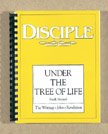 Greetings All:
Greetings All:I was reflecting this past weekend on our conversation regarding death during one of our recent Disciple IV classes (the one where I offered that I would prefer my ashes spread on my parents’ graves with no memorial of my own).
This weekend I was reading Will Durant’s The Greatest Minds and Ideas of All Time. Two of these minds were of John Keats and Walt Whitman. Keats heartbreakingly opined that had he had more time, he would have accomplished more. A poet studied in every college for the past two hundred years, laments that had I had more time he would have created something memorable. Keats died of tuberculosis at age 25. His name is not even inscribed on his memorial in Rome, only the epitaph,
Here lies One Whose Name was writ in Water.
Aside of reflecting Keats’ sensitive nature and supporting Augustine's definition of humility, is this not exactly the final sentiment the Teacher in Ecclesiastes promoted?
In contrast to Keats, the lusty and long-lived Whitman, an adamant humanist, propelled Ecclesiastes’ message differently, extrapolating the Teacher’s thinking in these lines from Book III – Song of Myself from Leaves of Grass:
I depart as air, I shake my white locks at the runaway sun,
I effuse my flesh in eddies, and drift it in lacy jags.
I bequeath myself to the dirt to grow from the grass I love,
If you want me again look for me under your boot-soles.
You will hardly know who I am or what I mean,
But I shall be good health to you nevertheless,
And filter and fibre your blood.
Failing to fetch me at first keep encouraged,
Missing me one place search another,
I stop somewhere waiting for you.
Unwittingly (or perhaps not) Whitman describes the legacy of Christ from the lesson of the Teacher in Ecclesiastes.
13 The end of the matter; all has been heard. Fear God, and keep his commandments; for that is the whole duty of everyone. 14 For God will bring every deed into judgment, including every secret thing, whether good or evil.
Not a bad spiritual thread from the 1st Century, BCE through the 19th Century, ACE. See you guys Wednesday.
Michael
© Copyright, C. Michael Bailey, 2006
